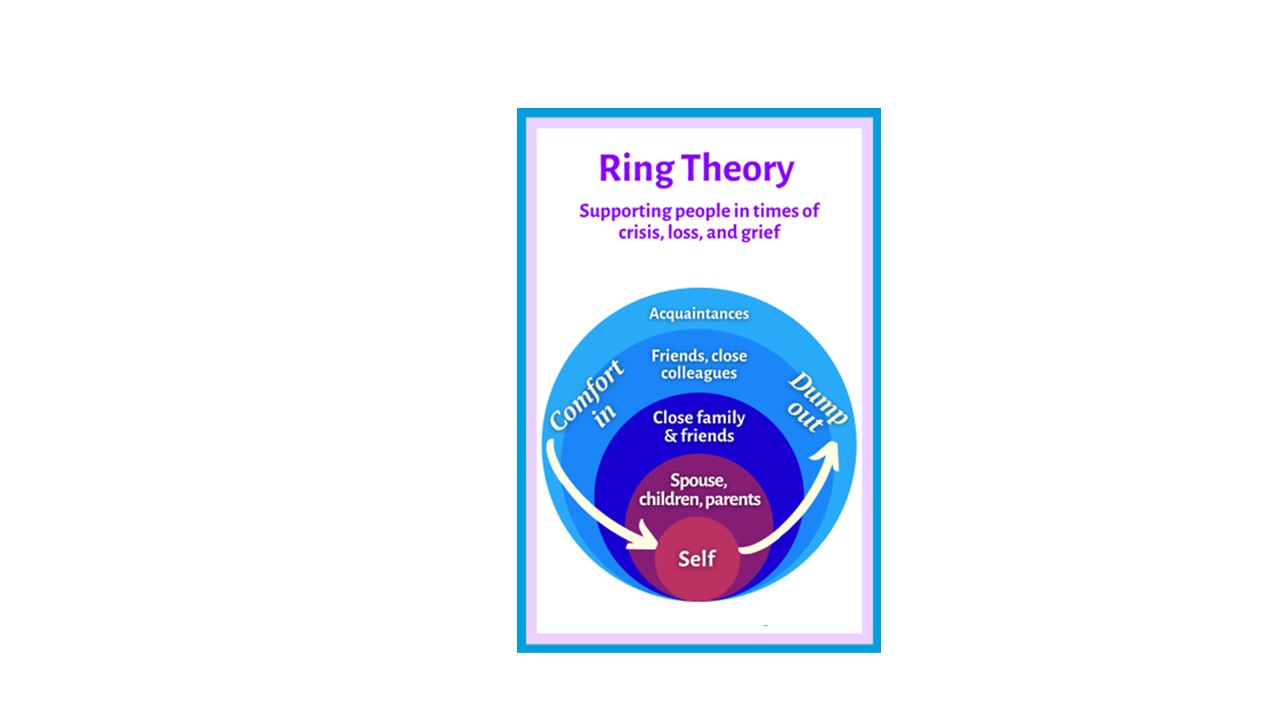Like a pebble dropped into a pond, circles radiate outward from the center of the situation. Which circle are you in?
Recently, I witnessed a troubling conversation. A friend just had cancer surgery and an acquaintance asked how she was and then launched into a rant about how her father also had a similar cancer. She went on and on about how terrible the care was and, in the end, he died. My friend who was just weeks out of her own surgery and facing chemo, offered comfort to her.
Enter Ring Theory. This was a case of “dumping” and discharging anxiety onto a person already in a difficult situation. Ring theory, born out of grief experts, can be useful to all of us coming out of a 2 year pandemic. The main idea is that you provide comfort IN to the inner circle, mostly by listening well and only providing support. We then dump OUT – complain and discuss our feelings and distress to those in the outer circles. We do not dump onto the person in the most distress.
Ring theory (AKA Theory of Kvetching) suggests you provide support or comfort IN the center of the circle, and seek support outside the circle, dump OUT. Avoid dumping your emotions into the middle of a crisis, talk to your other friends about how sad you are without adding to the turmoil and pain. Comfort IN/Dump OUT
As you gather at Thanksgiving, to feast or fast, no matter where you find yourself in the circles (and I know many people on the raggedy edge) provide comfort to those closer to the center than you. Only comfort those inside. Seek support from those farther out in the circle.
Comfort in Phrases:
- “What would be most helpful right now for you? Can I drive carpool this week?”
- “Don’t worry about work right now. I’ve got it covered.”
Dump Out Phrases
- “I’m worried I have to cover for him at work…I can’t imagine what he’s going through”
- “I’m exhausted by all of this. I can’t take any more bad news. At least they didn’t amputate it”.
Where words are restrained, the eyes often talk a great deal.
-Samuel Richardson Novelist 1689-1761
Wellness Ideas
Getting our human needs met. A stunning idea on how we can teach peace as a literacy– just as we learn basketball or math skills. The idea of Peace Literacy has everything to do with our individual wellbeing.
The Wisdom of Children and Emotional Regulation: Just Breathe
Stay Well, EIleen


Always love your news letters!
Yes, easy for us to complain especially if that person in need asks you.
Keep it short and return conversation on what you can do for them.
I learned this the hard way with a friend who is a therapist. She was on her way to a minor surgery but was nervous. I called her to support her .
She is really good at asking questions and so she asked me several questions about myself and then later was angry with me and called me selfish.
It was a mistake on my part to talk about myself in that instance even if the person asks keep it short and return the conversation to them.
Thank you!
I don’t think I understood this. I get that the person in the example shouldn’t have turned the conversation to the father who died. It was unhelpful for the friend. The diagram leads me to believe we only complain to people in the outer circles. Is this the intended message?
HI. Yes I think you have it. It applies when the person at the center is in distress, undergoing a challenge. This article from the creators of the “theory”– a breast cancer survivor, writes about it beautifully here:
https://www.latimes.com/opinion/op-ed/la-xpm-2013-apr-07-la-oe-0407-silk-ring-theory-20130407-story.html
Happy Thanksgiving to you and yours, Eileen
Ring theory rings well with me. Positive statement after listening and for me to use safe support group-12 Step- to dump out my issues in safe area.
Wonderful advice and very timely for the holidays. It makes so much sense to not burden the one needing comfort the most. It is time to practice listening.
HI Sally and thank you- I hope to keep becoming better listener too!